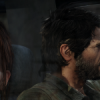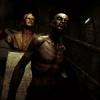The Last of Us is set in a world where a particular strain of parasitic fungi named Ophiocordyceps unilateralis takes over humankind’s spot as the apex predator. The player takes on the role of Joel, a grizzled smuggler whom, on a mission with his partner / potential lover Tess, is given the charge of care for a special little girl named Ellie. The two of them trek through a hostile, lush post-apocalyptic America to reach a friendly Firefly base.
What makes this relationship work is the shaky bedrock of Sarah, Joel’s daughter. Ellie, as hard as she yells and curses that she isn’t Sarah, ultimately replaces Sarah. The replacement isn’t entirely zero-sum: Joel tells Ellie about Sarah with fondness in his voice, but the parallels are there. The Last of Us is a look into Joel’s selfishness and argues that for all the damage it does, it’s a display of vulnerability, not malice.
For this message to work, Joel’s arc needs to work. For Joel’s arc to work, Sarah’s death needs to work. And it does.
I came into The Last of Us expecting Sarah to die. The primary relationship is clearly between Ellie and Joel, so it doesn’t make any sense for Sarah to be relegated to backstory and arc assistance unless she isn’t an active character in the story.
To me, it’s not the surprise that makes it work; it’s its emotional honesty. It’s so patently different from everything that precedes it that it’s more of a surge than a shock.
The opening follows the structure of beige prose. Naughty Dog has shown in the Uncharted series that they can do action scenes to keep you on the edge of your seat, but I’ve never really seen them approach solemnity and quiet earnestness without making it seem clichéd. The Last of Us’ opening scene begins at night, making use of the quiet atmosphere and Gustavo Santaolalla’s mastery of musical tonal deftness.
The conversation doesn’t feel out of place, but it establishes some very important points. One, we learn that Sarah somehow has a way to make money, and she spends what seems to be a considerable amount on it for Joel. Two, Joel is curious, but isn’t phased by it, even playing along with Sarah’s joke. Three, there is no reference to a mother, so the game implies that it’s just the two of them. Four, it establishes the watch as Sarah’s avatar, which becomes a central symbolic piece in the future. The conversation is littered with small tidbits, moving with ruthless efficiency from point to another while making it seem incredibly natural. It’s very laconic.
Leading up to the death scene, our only major dialogue between Joel and Sarah is Sarah giving Joel his watch. In that span of time, barely a minute and a half of dialogue is exchanged between the two of them, and then another accumulated 15 seconds or so of dialogue during the driving. Sarah’s death scene takes up a whole minute, which doesn’t seem like very much, but that’s a relatively lengthy ratio for interaction. In the five minutes or so that are strictly interaction between Joel and Sarah, a fifth of that is Sarah’s death, two fifths is a conversation between the two, and the last two fifths consist of small actions such as Joel carrying her up the stairs or dealing with their zombified neighbor.
The time accumulated is a somewhat nitpicky thing to focus on, I’ll admit, but it does show that portions devoted to Sarah that reveal a very finely crafted, efficient use of Sarah’s time to evoke empathy. The death of one little girl at the beginning of The Last of Us, if done with mediocrity, doesn’t guarantee a compelling scene: the death of Mr. Davis’ wife and daughter in Call of Duty: Modern Warfare 3 feels sudden and cheap. It lacks that same sombreness.
Of course, Sarah’s death might not hit with the same sort of shock or heft as more famous death scenes, such as that of Aerith from Final Fantasy 7, and it doesn’t have the same sort of twisted catharsis that we’d expect from the death of Harry Mason in Silent Hill 3. For the most part, Sarah is introduced as a MacGuffin: she’s a relatively important individual element that gives Joel a trigger to fight for in the future, but ultimately doesn’t play a very critical component to the plot by herself. Her relationship to Ellie and Joel is one of comparison and parallelism, but as an actor she doesn’t do anything. Instead, she functions as a fulcrum for Joel and Ellie’s relationship, and Naughty Dog knows that. She has incredibly short screen and game times, and since The Last of Us is focused on meaningful quietness in its scenes (most of the deaths in The Last of Us begin without music, frenetic action, or loud noises), Sarah doesn’t really say or do much.
But her death is probably the most important death in the game and probably hits the hardest.
There’s something clever about how Sarah is presented, how she’s handled, and how she’s killed. Her as the fulcrum for Joel and Ellie’s relationship doesn’t necessarily make it empathetic, so it’s not about what role she plays, but rather how her importance is presented. Her death hit me harder than I had expected, and perhaps it’s because Naughty Dog is unafraid to focus on a peculiar, Stephen King-like mundane-ness about her that makes her seem more alive. Part of it might be because you play as Sarah for the prologue. She’s slow, weaponless, sluggish to maneuver, and her worried voice begins to become our own as we inhabit her narrative space (was I the only one scared of the dogs barking in the backyard?).
Another part of it, no doubt, is the massive attention to detail in the cutscenes: those small movements, the wide, expectant look in her eyes as she gives Joel the watch, and the way her face switches to an amused but annoyed look when he jokes that it’s broken. Part of it seems to be her character design: her eyes are large, her moves are deft and unassuming, her posture and position is demure. She’s a tiny girl that’s presented as powerless but not cartoon-ish. She’s never presented as standing or powerful and in almost all of her cut scenes she’s shown to be carried by Joel in a sort of dark, symmetrical fashion (he carries her to bed just as he’s carrying her to safety, only for her to die). When we look at Ellie, her opening scene is lunging at Joel, ready to defend Marlene. Sarah begins and remains vulnerable.
There’s another part left up to the voice actress Hana Hayes, whose voice acting is exceedingly well done. Sarah’s choking, her wheezing, and her cries seem so realistic compared to other characters (Thane from Mass Effect 3, for example). Her voice syncs up so well with the movement of her mouth that we forget we’re watching a cutscene. In addition to Hayes, Tory Baker’s performance captures the clenched fists and gritted teeth we expect from a father trying to cradle his dying daughter as he implores her to stay alive.
There’s something interesting about Sarah’s death that aids in its gravity. Joel’s words as her eyes glass over are ultimately selfish. “Don’t do this, don’t do this to me, baby.” He implores to her with panic, every syllable wavering more and more by the second. Sarah’s death is the clearest picture of Joel’s character: he’s a father, but he’s also selfish, and instead of comforting her as she dies, he tells her to fight it. He implores her to fight it.
He wants her to stay, for him. In The Last of Us, much of the game is about Joel as a manly man, wearing flannel and building flamethrowers in a derelict America as he snaps necks and shiv faces. Despite its stealth mechanics, it’s a power fantasy for much of the game. Sarah’s death is important because it firmly establishes that Joel’s masculinity is a shield for a greedy, vulnerable, and emotionally damaged human being. Sarah’s conversation and death is a sort of twisted awakening, where a tired but loving father becomes an asshole who’s unwilling to open up or move on because he’s scared of the consequences of repeated loss. When he’s beset by the fear of loss again, Sarah’s death propels him to cloister himself in his selfishness and do whatever it takes to make it right for him.
Of course, Sarah’s death is likely an amalgamation of all of these factors. I can’t pin it down to one thing. For a scene to punch so hard with so little development of the characters beforehand, it takes a masterful and highly efficient use of design, gameplay, pacing, and setting.
I might also be overplaying the profoundness of her death; people could be legitimately blindsided by it. People might not really care about it. I understand. For someone like me, who was expecting her to die, Sarah’s death still evokes something. It has a peculiar resonance that’s very difficult to describe, and there’s a haunting helplessness that comes with watching Joel cradle the body of his daughter in his arms. It marks the end of something cozy and familiar. There’s no “I love you” speech or last words as her eyes glass over, just pain.








